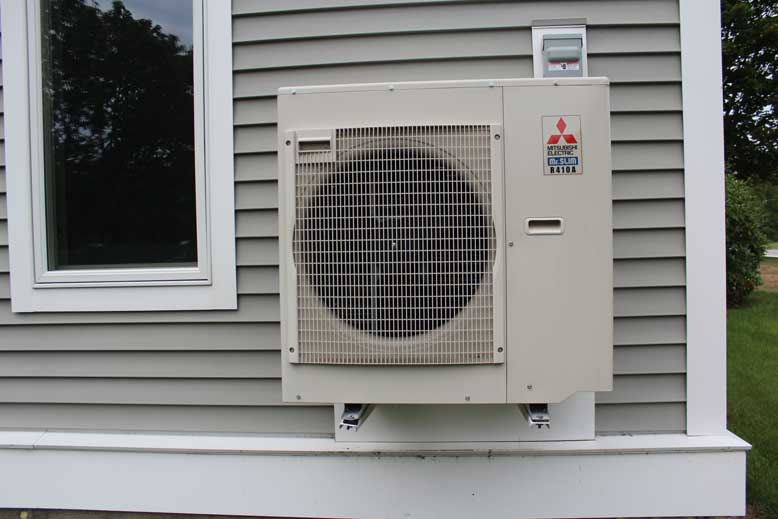Recent research by Efficiency Maine makes the case that replacing homes’ entire heating systems with heat pumps can be cost-effective and comfortable, even in Maine’s notoriously cold winters.
“Here, it got 21 below last winter,” said George Hardy, who participated in a pilot program as part of the research. “I was a little worried about the heat pumps, but they held out. They kept us warm.”
As Maine attempts to reach its ambitious goal of going carbon neutral by 2045, home heating is going to be a major problem to solve. More than 60% of the state’s home heating systems burn oil — one of the most carbon-intensive heating fuels — more than any other state.
Maine has made air-source heat pumps a centerpiece of its strategy. Heat pumps pull heat out of the surrounding air, even at cold temperatures, and transfer it into the home. The only fuel they use is the electricity needed to run the pump. Maine has set a goal of installing 100,000 heat pumps by 2025, a target it is well on its way to reaching: In 2021 alone, more than 27,000 new heat pumps came online in the state.
Often, however, homeowners install just one heat pump, but continue to use fossil fuel sources as a backup, an arrangement that can undercut the ability of heat pumps to save money and reduce emissions. Efficiency Maine, therefore, has been undertaking research to bolster the argument for jettisoning the oil and propane altogether and moving toward whole-home heat pump systems.
“We’re reaffirming our expectation that they work in cold climates and will keep you comfortable through the entire winter,” said Michael Stoddard, executive director of Efficiency Maine. “We want to see the heat pumps being used to their full capacity.”
Promising results
Recent results have been promising. An ongoing pilot program replaced fossil fuel furnaces in 19 homes — 10 mobile homes and nine conventional wood-framed homes — with heat pumps to investigate how well standalone systems would perform. Feedback from participants after one winter has been overwhelmingly positive, Efficiency Maine reports. Homeowners praised the evenness of the heat and say it kept them toasty even as temperatures dropped well below zero.
Efficiency Maine also conducted case studies, assessing the performance of 10 homes that were already using a heat pump as their primary heat source. The homes ranged in size and age, and used a variety of heat pump technologies. They also had a range of backup system types, including oil, wood, electric, propane, and kerosene. The participating homes were metered from February to June of 2021, so researchers could understand how much energy was used, how well the systems performed, and how indoor temperatures fared when temperatures dropped outdoors.
Over the study period, seven of the 10 homes did not need to use their backup heating. As outdoor air temperatures rose and fell throughout each day, the indoor air temperatures stayed within a narrow range, avoiding the temperature spikes and plunges so often associated with fossil fuel furnaces. All participants reported they were satisfied or very satisfied with the performance of their heat pump systems during the study period.
Hardy and his wife Catherine, of Dexter, Maine, already had one heat pump in their 1890s home when they joined the pilot. They received a second heat pump, replacing their previous oil-burning forced hot air system.
They have not one negative thing to say about the experience, they said. From November through April — the most heating-intensive months of the year — they paid a total of $1,000 for electricity. By way of comparison, heating a home with an oil furnace for a full year would have cost more than $3,000 even at last winter’s much lower heating oil prices. Their heat is even and reliable, and they now get to enjoy air conditioning during warmer months as well.
“I don’t hesitate to leave it on in the summer because I know it’s going to cost us hardly anything,” Catherine Hardy said.
Moving the market
It is unclear, however, whether homeowners and builders are yet as enthusiastic about the prospect of heat pumps. Interest in heat pumps and other alternative heating arrangements has certainly increased, said Melanie Merz, executive officer of the Home Builders and Remodelers Association of Maine. But she does not believe the market is ready for wide-scale adoption quite yet.
Consumers are still uncertain about adopting such a new technology and are worried about heat pumps’ ability to perform in Maine’s harsh winters, she said. Also, builders are generally concerned about making their homes attractive to buyers, and the higher up-front cost of heat pumps can be a deterrent, despite evidence that heat pumps save money in the long term.
“We all conceptually know that there is an eventual return on investment, but are we willing to sacrifice going with tried-and-true products?” Merz said. “I don’t think we’ve reached any sort of tipping point in the market.”
While it seems likely Maine will achieve the goal of installing 100,000 new heat pumps in the next three years, whole-home adoption will need to become much more common to make a real dent in the state’s home heating emissions. And achieving that goal is going to mean educating consumers and convincing more contractors to encourage customers to go with heat pumps, Stoddard said.
Already, he said, some movement is underway: About two of every 10 new homes built in Maine now are all-electric. But more must be done to convince buyers and builders alike that heat pumps are both environmentally and financially wise, he said.
“It’s human nature for them to stick with what they know has worked in the past,” Stoddard said. “It’s sort of a culture shift.”
This story originally appeared in Energy News Network and is republished here with permission.







